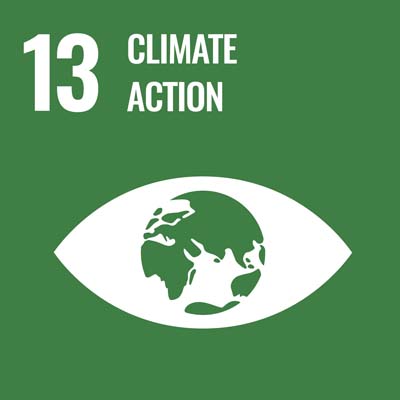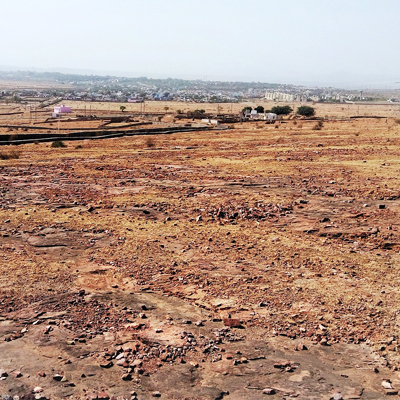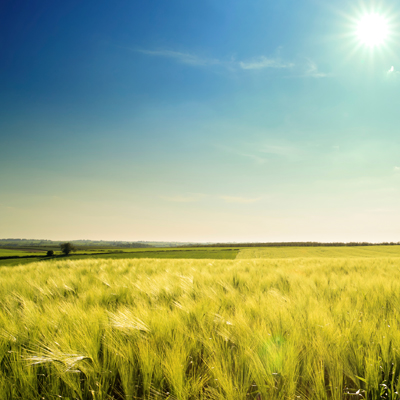The thirteenth Sustainable Development Goal is to take urgent action to combat climate change and its impacts.
2023 progress report
Our organisation
During 2023, the Energy and Environment Committee developed a new Climate Change Adaptation strategy.
Infrastructure
Two major projects were completed during this year that are projected to save 3,000 tCO2: In early 2022 an £11 Million bid to the Public Sector Decarbonisation Scheme (PSDS) secured funding for the insulation of our two large aircraft hangars, further improvements to the district heating with an additional air source heat pump and an additional solar PV array. A further £4 Million from PSDS will support additional improvements to the district heating system.
Education
As we move to reduce greenhouse gas emissions significantly around the globe and work toward net zero, the need for knowledgeable, highly trained, highly skilled managers and engineers has arguably never been greater. 2023 saw the first cohort of students supported by the Brian Meredith Net Zero Scholarships targeted at students and courses with a high impact in the transition of net zero.
We released a new induction module for students which focuses on sustainability for the University and beyond. It includes two new interactive games, quizzes and other elements focused on recycling and energy/water saving.
Research
Highlights from our climate action research in 2022/23 included:
- A major new collaboration between Regional & City Airports (RCA), global travel company TUI and Cranfield University investigating how to reduce the environmental impact of aircraft turnarounds at airports.
- Cranfield was awarded funding to support early career researchers to explore interdisciplinary solutions to enhance environmental resilience. https://gtr.ukri.org/projects?ref=NE/X018326/1
- Designing a device called iDirac, which is currently operating remotely from the Rothera research station in British Antarctica. The instrument can remotely analyse molecules from the air in Antarctica and will help scientists understand future changes in our climate.
- Reframing non-CO2 climate mitigation approaches to limit global warming – Dr Michelle Cain’s UK Research and Innovation’s flagship Future Leaders Fellowships programme is underway.
- Cranfield was shortlisted for this year’s Times Higher Education Awards Research Project of the Year: STEM. The Enabling Aircraft Electrification (EnabEl) research project headed by Dr Guy Gratton aims to change aviation to meet 2050 targets is dependent on faster progress towards certifying new technologies, more open access and sharing of the fundamental building blocks for the design, testing and flight of sustainable aircraft.
Outreach
The Cranfield-Colworth Innovation Challenge ran for the fifth year running, culminating in a final round where Cranfield students pitched their sustainability solutions to industry executives and academics.
UK company ENSO, nominated by Cranfield University, was one of 15 global finalists for the 2023 Earthshot Prize chosen from more than 1,100 nominees.
We hosted the IET’s (Institute of Engineering and Technology) Faraday National Final, encouraging young people to careers in STEM. The schools taking part had designed a prototype supporting UKRI’s 'Future Flight Challenge'.
Supporting business
In 2023, Cranfield was awarded prestigious Small Business Charter accreditation in recognition of its delivery of high-quality programmes such as the Business Growth Programme and Ready for Scale.
Ready for Net Zero Growth scholarships were launched to support access to an executive online programme for SMEs to create a growth plan incorporating the carbon reduction plan for their business.
In the 2023 MK Soapbox Science, one of Cranfield’s PhD students talked about her work modelling farmers’ behaviour and predicting its impact on the environment, and another talked about her work to look at what happens to pollution underneath the ground surface.
2022 progress report
Our organisation
The University was officially certified for ISO 50001 for its energy management system. Our Carbon Management Plan includes a target to reduce our carbon emissions to net zero by 2030.
Infrastructure
During the year, we have continued to upgrade our infrastructure. A biomass boiler has been installed together with an air source heat pump. As well as upgrading the building management system and installing LED lighting, the University’s solar farm has been extended. The upgrades were made possible by an award of £4.9 million, through Phase 2 of the Public Sector Decarbonisation Scheme (PSDS).
In 2022, a new hydrogen refuelling station came on stream.
Education
As we move to reduce greenhouse gas emissions significantly around the globe and work toward net zero, the need for knowledgeable, highly trained, highly skilled managers and engineers has arguably never been greater. We have addressed this need through a Global Environmental Change MSc, an Environmental Management for Business MSc, and Net Zero Industrial and Environment and Agrifood Net Zero scholarships to make our sustainability courses more accessible.
Research
Highlights from our climate action research in 2021/22 included:
- Reframing non-CO2 climate mitigation approaches to limit global warming – Dr Michelle Cain was awarded funding for this work by UK Research and Innovation’s flagship Future Leaders Fellowships programme, which aims to address major global issues and commercialise innovation.
- Integrated constructed wetlands (ICWs) for the removal of micropollutants and climate change control for the removal of micropollutants and climate change control.
- Introduction of a new Discipline Hopping programme to provide funding for up to eight early career researchers to identify a programme of work that can develop a roadmap for environmental solutions through a whole system approach.
Cranfield partners with the National Centre for Atmospheric Science to host FAAM, a world-class research facility dedicated to gathering data to advance atmospheric science. FAAM operates a specially adapted research aircraft to make cutting edge measurements in the atmosphere, almost anywhere in the world. It serves scientists working in UK universities and at the Met Office and carries out work for UK Government bodies, commercial organisations, and international research bodies.
Outreach
In 2022, Cranfield University was selected to help search for solutions to repair and regenerate our planet, as an official nominator for the prestigious 2022 Earthshot Prize.
Our schools visit for International Women in Engineering Day (INWED) included sustainability/climate action focused events.
The new Cranfield Aviation and the Environment Network Hub aims to create a forum for undertaking the challenging agendas of net zero and climate change related to aviation.
Supporting business
We continued to support businesses through short courses on climate action planning and we partnered with Rothamsted Research on the SHAKE climate change for agriculture programme to help entrepreneurs and start-ups who are combating climate change with science or tech-based ideas in the areas of agriculture and food production.
2021 progress report
We have set a number of ambitious, challenging environmental objectives in support of our Environmental Policy and Energy Code of Practice. They are managed through our ISO 14001-certified environmental management system, and through our ISO 150001:2011-certified energy management systems. An overarching Board for Energy and Environment of senior managers, supported by the Energy and Environment Team, is responsible for providing oversight and direction in managing our environmental impacts.
In 2021, Cranfield made the strategic appointment of Professor Chris Fogwill as Pro-Vice Chancellor of our School for Water, Energy and Environment. He is a climate scientist and Earth systems modeller and formerly led Keele University’s Institute for Sustainable Futures. He is now championing climate action for Cranfield.
For 'This is Engineering' Day 2021, we launched a collection of content and activities for schools, and the wider public, showcasing some of the great work taking place at Cranfield, and encouraging them to become climate change heroes.
At the end of 2021, we featured at COP26 in Glasgow as part of the Green Zone activity taking place during the summit. Audience members had the opportunity to take part in our Exploring Sustainable Futures Game, a role-playing learning experience used by the Sustainability group at Cranfield.
Courses/modules relating to the goal
The following courses either address sustainability entirely or contain modules that are focused on sustainability-related topics.
Advanced Digital Energy Systems MSc
Advanced GIS and Remote Sensing MSc
Advanced Lightweight and Composite Structures MSc
Advanced Materials MSc
Advanced Mechanical Engineering MSc
Advanced Motorsport Engineering MSc
Advanced Motorsport Mechatronics MSc
Aerospace Dynamics MSc
Aerospace Manufacturing MSc
Aerospace Vehicle Design MSc
Air Transport Management MSc (Executive)
Air Transport Management MSc
Aircraft Engineering MSc
Airport Planning and Management MSc
Airworthiness MSc
Astronautics and Space Engineering MSc
Automotive Engineering MSc
Automotive Mechatronics MSc
Autonomous Vehicle Dynamics and Control MSc
Computational Fluid Dynamics MSc
Design Thinking MDes
Engineering and Management of Manufacturing Systems MSc
Environmental Engineering MSc
Environmental Management for Business MSc
Executive MBA
Finance MSc
Food Systems and Management MSc
Future Food Sustainability MSc
Global Environmental Change MSc
Global Product Development & Management MSc
Management and Corporate Sustainability MSc
Management and Human Resource Management MSc
Management MSc
MBA
Renewable Energy MSc
Robotics MSc
Sustainability MSc
Thermal Power and Propulsion MSc
Through-life System Sustainment MSc
Water and Wastewater Engineering MSc



